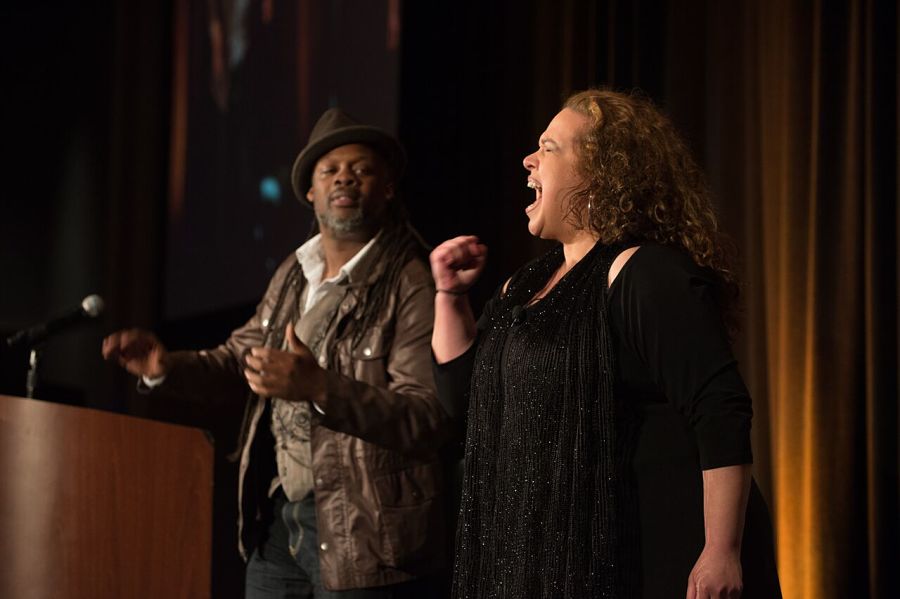PORTLAND, ORE.: Theatre companies have productions, but what do theatre service organizations who don’t mount shows do? According to Theatre Communications Group’s executive director, Teresa Eyring, they have conferences.
“The national conference is our big production of the year,” she told the crowd at the final plenary session of TCG’s 2017 National Conference in Portland on Saturday, before asking the audience to applaud for the TCG staffers and volunteers who helped make the event possible.
“The growth and development of our theatre field would not be possible without the commitment of the funding community,” said Eyring. And that is why annually, TCG gives out two funder awards: one for a local foundation, and the other for a national foundation.
The recipient of the first award, the Regional Funder Award, was the Portland-based James F. and Marion L. Miller Foundation, which, over 15 years, has given away almost $70 million to 236 arts organizations in Oregon. In accepting the award, the foundation’s executive director, Martha Richards, compared art-making to long-distance running. “You run the marathon and we are standing at one of the water tables, handing you a cup of water,” she said. “We never forget that the work is not about us but about the people whose work benefits the lives of people all over our state.”
She ended her speech with an entreaty to the crowd that drew some appreciative laughter. “There’s never been a more important time for the work you do,” she said. “Please continue to bring our audiences joy and laughter, history, perspective, and reminders of the humanity which binds each to the other. Wake us up, slap us around, and then toss us back in our seats to reflect on what we’ve seen and heard.”
The National Funder Award was given to the William and Eva Fox Foundation, which has given $2.8 million in fellowships to 335 actors since 1994 (they also fund the TCG’s Fox Foundation Resident Actor Fellowships). Actor André De Shields, a former TCG Fox fellow, attributed the honor to helping him navigate an artistic crisis in 2012, a period when he was beginning to feel invisible. “That recognition from the Fox Foundation and Theatre Communications Group has to this day been the most important moment of recovery in my adult life,” De Shields enthused.

He then presented the award to Fox Foundation president Robert P. Warren, who accepted it in a bit of self-deprecating fluster. “As I told André before this: If I collapse, just make my mouth move and he can just provide the vocal,” Warren joked. He reaffirmed the foundation’s commitment to performers, saying that “actors are essential artists in our society whose performances help to define our individual humanity. Simply put, actors are a precious resource who must be nurtured and given an opportunity to stretch, to grow, to challenge themselves professionally in order to reach a higher level of artistry.”
That made a perfect segue to the plenary’s and conference’s finale: a conversation between director Chay Yew and the award-winning theatre ensemble Universes, an ensemble of performers who collectively devise shows that blend theatre, poetry, dance, jazz, hip-hop, and politics. Their works—including Party People, Ameriville, and Slanguage—have toured the country and won numerous awards. Universes members headed in from Southern Oregon, where their current show, UniSon, is running at Oregon Shakespeare Festival; the show mixes original music with unpublished poetry by August Wilson.
Yew sat on the stage with Steven Sapp and Mildred Ruiz-Sapp, the husband-and-wife duo that cofounded the group. They recalled their early days as a slam poetry ensemble, driving around in a van to poetry clubs in New York City. “We would sit in the car and just kind of do this,” and here Sapp bopped up and down, miming words with his mouth. “It had the best acoustics, and we would sit there and start doing poetry.”
Quipped Ruiz-Sapp, “I don’t know why you guys have theatres—you should have vans!”
Soon after they were introduced to New York theatre directors Mark Russell and Jo Bonney, who encouraged the troupe to expand into theatre. (And in an amusing aside, on the theme of full circle, Sapp admitted that when they were younger and poorer artists, the Universes team would sneak into TCG conferences. “We would find out where it was. We would drive to it, we would park the car, get a room,” said Sapp with a laugh. “We would hang out in the lobby, with no tags. Just hang out in the lobby, and we would talk to people. Then when the crowd would go, we would just slide in with them.”)
Yew asked them how they create their work. “We don’t have a definite way that things happen; the important thing is we have to be kind of sequestered,” answered Ruiz-Sapp. Though she did offer some specific practices: “Every first time we started doing this, we turn off all the lights. We say, ‘Let’s just listen to each other breathe.’” From that collective energy emerges the work of Universes. Said Ruiz-Sapp, in a much-retweeted statement: “We believe everyone can sing, we believe everyone can write, everyone can dance, everyone can express—it’s different for everyone.”
That community-focused process also inspires the topics of their plays, they said. “Our lives inspire us,” said Ruiz-Sapp. “The people we have interacted with. The people that raised us. The community that raised us.” Both grew up poor in the Bronx; he is African-American, she’s Latina. Works like Slanguage drew inspiration from the diversity of New York City, while Party People was inspired by Civil Rights-era activists, the Black Panthers and the Young Lords, featuring interviews with real people.
UniSon was inspired by an event in Sapp’s life. In 1995, he was at a writer’s conference and August Wilson was one of the speakers. Instead of giving a speech, the playwright read one of his poems. “I was like, ‘August has skills. August is a poet!’” recalled Sapp, amazed. “I never forgot that.”
Though Wilson’s poetry was never published, Wilson’s widow, Constanza Romero, granted the theatre company access to boxes of her late husband’s poems, some written on napkins and spare pieces of paper. “We didn’t want it to look like an August Wilson play,” said Mildred-Sapp. “It was about changing the ways we see August Wilson by doing what we do and using August Wilson’s poetry as the shockwaves.”
In a conference defined by full circle, this newest work holds particular poignance for Universes. “We started out as poets,” said Mildred-Sapp. “We became poet-playwrights. We went on a journey interviewing people and understanding the country. Now we are back to being poet-playwrights using the poetry of an American master.”
The session ended in song: one in which Ruiz-Sapp sang in Spanish with her husband and the crowd (in true collective Universes fashion) provided percussion, and the other a video of the duo’s teenaged son Quest Sapp, singing “Feelin’ Good” by Nina Simone. In a note to the supportive and familial nature of theatre, Mildred-Sapp expressed her gratitude to the field. “Everybody knew if Universes was showing up, so was our son,” she said. “We want to thank you all for helping us raise him.”
As is customary, Eyring had the last word. After announcing that the 2018 TCG National Conference would take place in St. Louis, Mo., she closed with an invitation: “Thank you, the conference is ended. Let’s go drink.”


